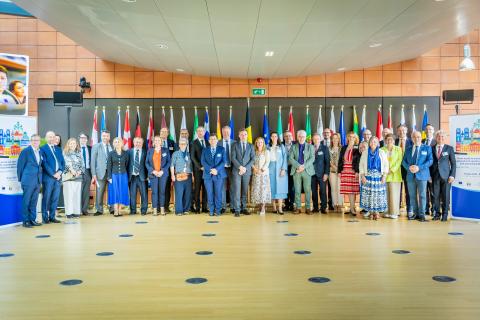European Economic
and Social Committee
Social and civil dialogue can help the EU grow sustainably
Just a few days after the 2024 European elections, the European Economic and Social Committee (EESC) and the EU’s national Economic and Social Councils met to discuss the state of play of the ongoing digital and green transitions. Their conclusions: organised civil society is clearly instrumental in helping to remedy the shortcomings.
There are still too many obstacles standing in the way of a competitive, just and low-carbon economy in the European Union, revealed the high-level seminar held on 20 June 2024 in Brussels.
The event, entitled Transitions towards a digital, green, just and competitive Europe: the role of social and civil dialogue, was held by the EESC in cooperation with Belgium’s Central Council of the Economy (CCE) and National Labour Council (CNT), as part of the Belgian Presidency of the Council of the European Union.
The EU has embarked on a new sustainable growth strategy but is facing a number of critical external and internal challenges. Acute issues such as geopolitical tensions, growing economic competition, fragmentation and polarisation of societies, to name but a few, are preventing the twin digital and green transitions from being fully rolled out.
Organised civil society can and must make a difference: by establishing a genuine social and civil dialogue, it can play a part in designing, implementing and assessing public policies, and make them understood and accepted by our societies.
Grassroots organisations can grasp the impact and consequences of the transitions for the EU’s economy and society because they are active on the ground and understand what works and what doesn’t.
Roughly 85% of the objectives of the National Recovery and Resilience Plans (NRRPs) linked to the twin transitions are still to be implemented. Only a proper consultation of and support from organised civil society can make sure that the transitions in the EU are carried out efficiently.
At their annual meeting on 19 June 2024, the presidents and secretaries-general of the EESC and the EU’s national Economic and Social Councils (ESCs) took a firm stand.
They underlined that, given the speed and scale of the ongoing transitions, and if we are to manage them successfully, a wide range of stakeholders in our societies must be involved from the outset. The ultimate goal is to foster inclusive participation of citizens and civil society organisations in public policy-making.
This is also in line with public opinion where, according to a recent Eurobarometer survey, almost 9 out of 10 respondents declared that civil society played a role in promoting and protecting democracy and European common values.
The conclusions of the annual meeting also point out that all challenges hide seeds of opportunity; conveying this message more effectively will help to obtain public support for the ongoing transitions.
In this respect, the EESC and the network of the national ESCs continue to represent a vital tool for participatory democracy and offer an invaluable added value in building consensus across the Member States.
Quotes from high-level speakers
As we navigate through geopolitical tensions, economic transformations and societal changes, it is clear that our approach must be both comprehensive and inclusive. We must ensure that the green, digital and demographic transitions are managed with the active participation of civil society to achieve sustainable and inclusive growth. This collaborative approach is not just necessary but imperative for fostering resilience and maintaining our democratic values.
Oliver Röpke, EESC President
The geopolitical situation, the need to strengthen the competitiveness of the EU, and the digitalisation of the economy are all challenges facing us. We must tackle shortages in the labour market, increase the qualifications of workers and improve working conditions, but also implement ambitious social policies and strengthen social protection. And for this, we must support social dialogue, at all levels and in all areas.
Pierre-Yves Dermagne, Belgium’s Deputy Prime-Minister, Minister of the Economy and Labour
The socio-economic challenges facing the Member States require enhanced coordination and a common vision. We must pragmatically address ecological, digital and demographic transitions while strengthening social dialogue and the participation of social partners at all decision-making levels. The future of the Union depends on our ability to harmonise national interests to ensure sustainable and inclusive growth.
Benoît Bayenet, President of Belgium’s Central Council of the Economy (CCE)
The EU and its Member States have to tackle the multiple transitions towards a digital, green, just, inclusive and competitive society. This will have to be realised in an increasingly complex global and domestic political context. Active involvement of social partners and civil society at all levels will be required for such transitions to be carried out successfully.
Rudi Delarue, President of Belgium’s National Labour Council (CNT)
